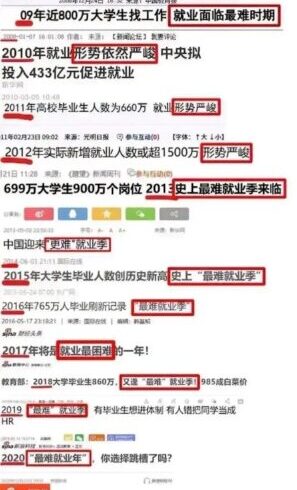
Amid a new two-month “Clear and Bright” campaign by the Cyberspace Administration of China (CAC) to clean up internet content that “maliciously incites” polarization, pessimism, anxiety, and other negative sentiments, a number of extremely popular online influencers have been hit with multi-platform content bans. Although the reasons for the bans are not entirely clear, there is no shortage of online speculation and commentary, some of it focused on the increasingly difficult task of navigating censorship-related “red lines.”
Among those banned this month were educational influencer and university entrance exam tutor Zhang Xuefeng; lifestyle influencer and livestreamer Hu Chenfeng; and travel vlogger and former professional gamer Lan Zhanfei. All were financially successful, in part due to their huge online followings on such platforms as Douyin (TikTok’s counterpart in the Chinese market), Bilibili, Kuaishou, Weibo, and in Lan’s case, the e-game livestreaming platform Douyu. Zhang Xuefeng alone was estimated to have between 30-40 million followers across all of the platforms on which he was active. Chinese internet users have dubbed the bans, which occurred in quick succession this month, the “three closures in a row” (三连封, sān lián fēng).
The bans follow recent disciplinary actions against Kuaishou, Weibo, and RedNote (Xiaohongshu) for alleged content violations, and a crackdown on “lying down” vloggers who espouse a simpler, slower-paced, “slacker” ethos. Past CAC “Clear and Bright” campaigns have focused on such diverse issues as the use of online slang and other “non-standardized” language; creating a “business-friendly” online environment; cyberbullying; independent content creators; materialism and wealth-flaunting; fandoms and celebrity culture; and gloomy sentiments during Spring Festival. The CAC’s latest announcement, dated September 22, takes aim at four specific types of forbidden online behavior:
1. Inciting polarization/antagonism between groups
2. Spreading panic and anxiety
3. Inciting online violence and hostility
4. Exaggerating pessimistic sentiments [Chinese]
In an article titled “The Malice Police,” David Bandurski at China Media Project discussed how the CAC’s latest campaign against “negative emotions” reveals an increasingly “obsessive and capricious control culture”:
Just the latest absurdly overweening action by the CAC, the notice is a prime example of how political and legal enforcement operate under the CCP. Rather than relying on consistent, transparent rules applied uniformly across platforms, China’s officials and regulators turn to sweeping “special actions” (专项行动) announced throughout the year, granting officials across the country’s vast bureaucracy broad discretionary power to pursue vaguely defined violations and make examples of bad actors — all with the goal of instilling fear and reshaping online discourse.
And fear is the point — whether we are speaking about the ethos of the regulators themselves, or about their tactics. Fear is the fundamental tool applied by agencies like the CAC and offices like the Central Propaganda Department to enforce political controls. A fearful journalist or editor, unable to see the red lines, will think twice. A fearful platform, like RedNote or Bilibili, will turn up the pace on deletions and account suspensions to ensure they “comply.” [Source]
CDT Chinese editors have archived about a dozen essays and articles (at least four of which have been deleted from WeChat) about the recent influencer bans and what red lines, if any, Zhang, Hu, and Lan might have crossed. Of the four censored articles, three were focused on Zhang Xuefeng: the first, from WeChat account District 526, discusses how Zhang might have overstepped in his “patriotic performance” following China’s September 3 military parade to mark the 80th anniversary of the end of WWII. (Zhang publicly pledged that, were China to invade Taiwan, he would personally donate at least 50 million yuan, and his company would donate no less than 100 million yuan to the cause.) Two other WeChat articles (“Now that Zhang Xuefeng’s Accounts Have Been Blocked, Does His 100-Million-Yuan Pledge Still Count?” and “Zhang Xuefeng Accidentally Steps on a New Red Line”) speculate on whether it was Zhang’s exorbitant pledge that led to him being banned, or his online business model—selling exam preparation materials and academic advice to anxious parents and prospective college students. One of the deleted WeChat articles, “The ‘Internet Celebrity Track’ Has No Space for Hu Chenfeng,” noted that it was difficult to discern where Hu might have stepped astray, given his commentary on such various issues as China’s pension system, the lives of young urban professionals, debunking unscientific viewpoints, questioning the value of Chinese herbal medicines, and expounding on his controversial “Apple people vs. Android people” theory.
CDT Chinese editors have also compiled some comments from Weibo and Zhihu speculating about why Zhang and Hu might have been banned. A selection of these are translated below:
不理不理右卫门: Both Huzi [Hu Chenfeng] and Zhang Xuefeng often danced on the red line, but they had a firm grasp of where the boundaries were. Now both have crashed and burned, because the red line has begun moving higher. Whose turn will it be next?
桔子酒店的关心: […] Although I really dislike the way Zhang Xuefeng sneers at the lower class and at students with poor grades, which law did he violate, from the perspective of policymakers? Clearly none. If they’re going to ban his accounts, at least state the reason for the ban. Even if the reason seems a bit flimsy, we’d probably accept it. But to ban accounts in this way without providing any explanation at all seems unjustified.
琪姐努力点: Those who insist on telling the truth are often the most unpopular.
野佛Devil: This is a place that doesn’t allow truth-telling.
阿拉木阿拉木: While Zhang Xuefeng definitely profited from “information asymmetry,” he also helped ordinary families to break down some of those information gaps. Just because he made money (legally, mind) doesn’t mean he’s some kind of a bad person. Ordinary families and students benefited from his presence.
双鱼弓长: Zhang Xuefeng made a valuable contribution by helping break down information barriers among prospective college applicants and entrance-exam takers from ordinary families. As for his recent comments, I don’t agree with them. By most measures, he’s already achieved fame and success, so I can’t understand how his views and values suddenly became so twisted.
天还是很蓝diamond: We’ve seen many cases where choosing the wrong major led to “compounded catastrophe for families that weren’t very well-off to begin with.” Zhang’s “mistake” was breaking through the information barrier about pathways to higher education—facts that were previously known only to an elite minority—and making that information available to the masses. [Chinese]
“Zhang Xuefeng Accidentally Steps on a New Red Line,” a now-deleted article from WeChat account “Like Light” speculates on what red lines Zhang Xuefeng and Hu Chenfeng might have crossed. The author acknowledges that while Zhang certainly enriched himself by preying on parental anxiety about their children’s education, he also offered frank, useful advice about favoritism, nepotism, barriers to entry, and which fields of study are in decline or unlikely to lead to good jobs after graduation:
For the vast majority of ordinary people struggling to get ahead, Zhang Xuefeng’s pragmatic approach to education offers practical value. At least when it comes to [advice about] choosing an academic major, he doesn’t deliberately withhold information or mislead people. As someone who urges working-class applicants to be pragmatic, he may not always see the future clearly (as when he mistakenly advised all and sundry to study civil engineering), but his view of the past is unvarnished (as when he advised everyone to avoid studying journalism).
He will even tell you frankly that [jobs in] certain fields have significant barriers to entry, so if your family origins are humble, you shouldn’t lightly venture into these domains.
When you think about it, the fact that a social Darwinist [like Zhang] would have the audacity to poach from the cultural elite by freely sharing knowledge to bridge the “information gap” is in itself a risky proposition, one that even suggests a certain idealism. [Chinese]
The multi-platform ban on influencer Hu Chenfeng also generated a great deal of discussion online. Many commenters noted that while his tendency to characterize the haves and have-nots as “Apple people” and “Android people,” respectively, was controversial, Hu was simply pointing out a socio-economic reality: “Hu didn’t invent class antagonism: he simply commented on it, and went viral.” A post on X mentioned that Hu’s use of the terms “Apple” and “Android” as stand-ins for “rich” and “poor” were just a reflection of how online censorship corrupts language. A WeChat article by journalist and editor Peng Yuanwen, “Three Ways Hu Chenfeng is better than me,” praised Hu for his ability to present the truth, disseminate common sense, and communicate effectively to a broad public audience via various social media platforms.
Both Zhang and Hu were severely criticized by state media. Soon after Zhang was banned, the online outlet Nanfang News (southcn.com, under the aegis of the Guangdong provincial government) published an op-ed titled “Education Cannot Be Hijacked by Utilitarianism,” criticizing Zhang’s business model and his emphasis on urging students to choose practical majors that will lead to jobs after graduation—an approach that the editorial claimed “seriously undermines the foundation of China’s scientific and technological innovation.” On September 30th, the official WeChat account of the Propaganda Department of the Zhejiang Provincial Party Committee published a piece accusing Hu Chenfeng of engaging in three kinds of concealed attacks (literally, “three hidden arrows”): leveraging the worship of foreign things to undermine societal consensus, profiting from young people’s anxieties, and using extreme emotions to distort people’s values.
A now-censored article from WeChat account Citizen Jin Jianguo, titled “Hu Chenfeng and Zhang Xuefeng: Two Scapegoats,” dissects the flaws in those criticisms from state media, and argues that both Hu and Zhang were scapegoated for simply pointing out the socioeconomic realities and inequalities that exist in China today:
It is fair to say that nearly all of the [Nanfang News] article’s criticisms of Zhang Xuefeng are predicated on extreme conclusions derived from extreme assumptions. It extrapolates diverse possibilities into inevitabilities, in order to arrive at “grave consequences.” This is no different from the Cultural Revolution-era practices of “criticism for the sake of criticism” and “elevating all issues to the level of politics.”
Moreover, while the article appears to be focusing on the big picture by banging on about the “pros and cons” for the nation, it essentially fails to treat people as human beings.
Is it worth worrying about the long-term structure of the nation’s talent pool, while the immediate predicaments faced by students and parents—such as employment pressure, tuition burdens, and academic competition—are not worthy of our serious attention? Does it make sense to dump all the blame on Zhang Xuefeng, as if he were the wellspring of educational utilitarianism? Before he came along, surely not all university students were motivated by the lofty ideal of nation-building. Does the saying “an education can change your destiny” refer not to one’s personal destiny, but to the destiny of the entire nation?
A collection of increasingly dire headlines from 2005 to 2024 show that worries about the competitive job market and unemployment among recent college graduates are nothing new, although the siutation appears to be worsening.
To put it bluntly, education didn’t become “utilitarian” because of Zhang Xuefeng; rather, in a society that universally venerates utilitarianism, Zhang Xuefeng emerged as a response to the times. In the words of prominent media figure Wei Zhou: “Utilitarianism does indeed have its faults, but condemning utilitarianism while failing to solve the underlying problem merely results in the expectation that some people will voluntarily sacrifice their own self-interest in the service of someone else’s ideals.”
Coincidentally, just days after this criticism of Zhang Xuefeng, there appeared criticism of Hu Chenfeng.
Zhejiang’s Propaganda department published an article titled “What’s the Point of Insisting on Dividing People Into ‘Apple’ Vs. ‘Android?’” It accused Hu Chenfeng of leveraging the worship of foreign things to undermine societal consensus, profiting from young people’s anxieties, and using extreme emotions to distort people’s values—exaggerating these into accusations of leading our nation’s youth astray, blackening the name of business enterprises, and “passing the knife” to hostile foreign forces.
However, Zhejiang Propaganda is somewhat more honest than Nanfang News: at least it acknowledges the existence of youth anxiety, extreme emotions, and the worship of things foreign. But like Nanfang News, it doesn’t believe these phenomena existed long beforehand. Rather, it attributes them to “unscrupulous content creators such as Hu Chenfeng” deliberately manufacturing divisiveness, inciting the emotions of certain groups, and peddling anxiety in order to become popular online. Therefore, the only way to solve these fundamental problems is to “neutralize those who sow division by depriving them of profits.”
Hu Chenfeng has shown some tendency toward stereotyping, discrimination, and trolling, particularly after he began live-streaming. But here’s the question: if ours were a society without antagonism, with everyone living in perfect harmony, would Hu Chenfeng still be able to earn hundreds of thousands of yuan per month? After all, in a date-shaped society [an egalitarian society in which the income distribution in a pyramid chart is shaped like a date, a jujube, or an olive], such extreme rhetoric would lack market appeal, attracting only a tiny minority. It is only in a divided, gourd-shaped society that there are enough followers to make it worth his while. [Chinese]





